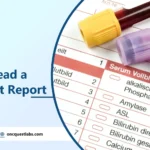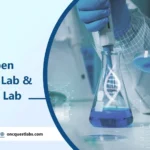Meet my friend, Ria. She’s not your typical friend – she’s a pathologist at Oncquest Labs, and oh, she loves talking about blood reports! Let’s step into her world. Ria starts her day in the lab, surrounded by mysterious vials of blood. She’s like a detective, trying to uncover the stories behind each drop. It’s not just a job for her; it’s a thrilling adventure.
Contents
The Language of Cells
Ria doesn’t just see red and white cells; she sees characters in a fascinating story. She talks to them, telling them to spill their secrets. Colleagues might find it funny, but Ria believes in a special connection with the cells under her microscope. What makes Ria stand out is her ability to turn complicated reports into simple tales. She uses everyday words, turning medical mysteries into stories anyone can understand. It’s like magic – making health talk less scary.
Quirks and Smiles
Ria’s lab isn’t just about serious science. She adds a dash of humor, making even the gloomiest reports a bit brighter. Her laughter echoes through the lab, turning the serious world of pathology into a lively place. Ria isn’t just a pathologist; she’s also a mentor. Newbies love learning from her because she doesn’t just teach facts – she teaches the art of storytelling in diagnostics. Her legacy is a generation that doesn’t just see numbers but stories in each report.
Ria’s Symphony of Stories
In the quiet corridors of Oncquest Labs, Ria’s story unfolds like a captivating novel. Her journey is not just about blood reports; it’s about making health a tale worth listening to. She turns the language of cells into a language of smiles, making the lab a place where science and storytelling dance hand in hand. Ria, the talkative healer, reminds us that even in the smallest drops of blood, there’s a big story waiting to be shared.
What Does This Story Teach Us?
Ria’s story teaches us the transformative power of passion and a unique perspective in a professional setting. It highlights the importance of finding joy and purpose in one’s work, even in fields that may seem inherently serious and clinical, such as pathology.
1. Passion Transforms Work into Adventure:
Ria’s enthusiasm for her work at Oncquest Labs turns routine blood analysis into a thrilling adventure. Her approach reflects that when you’re passionate about what you do, even the most mundane tasks can become exciting and fulfilling. It’s a reminder to seek joy and purpose in our chosen professions.
2. Connecting with the Human Aspect of Medicine:
Ria’s ability to see characters and stories in blood reports humanizes the often complex and clinical world of pathology. It emphasizes the importance of connecting with the human aspect of healthcare. By seeing beyond numbers and turning medical data into relatable tales, Ria bridges the gap between science and empathy.
3. Communication is Key:
Ria’s talent lies not just in analyzing blood reports but in translating the technical language into everyday stories. This skill makes health discussions more accessible to everyone. The lesson here is that effective communication is crucial, especially in fields like medicine, where understanding and empathy play vital roles.
4. Adding Humor to Serious Work:
Ria’s infusion of humor into her work environment lightens the atmosphere. It teaches us that even in serious professions, a touch of humor can foster a positive and collaborative work environment. It breaks down barriers, making the workplace a more enjoyable space for both seasoned professionals and newcomers.
5. Mentorship as a Legacy:
Ria’s role as a mentor extends beyond teaching facts; she imparts the art of storytelling in diagnostics. This underscores the impact of mentorship in shaping future professionals. The story teaches us that leaving a positive legacy involves not just sharing knowledge but instilling a mindset that values the human aspect of every task.
6. Finding Stories in the Details:
The narrative of Ria’s journey emphasizes the significance of paying attention to details. In the quiet corridors of the lab, each blood report becomes a chapter in a larger story. It encourages us to appreciate the intricacies of our work and recognize that even the smallest details can contribute to a meaningful narrative.
Ultimately, Ria’s story serves as a reminder that behind every medical report, there’s a person with a unique story. It prompts us to approach our work with curiosity, empathy, and a willingness to share the tales that unfold in the course of our professional journeys.
What is the Importance of Blood Report?
The importance of a blood report cannot be overstated, as it serves as a crucial diagnostic tool that provides valuable insights into an individual’s health. Here are key aspects highlighting its significance:
1. Disease Detection and Diagnosis:
Blood reports play a fundamental role in detecting and diagnosing various medical conditions. Abnormalities in blood cell counts, levels of specific proteins, or the presence of certain substances can indicate the presence of diseases, ranging from infections to serious conditions like diabetes, anemia, or leukemia.
2. Monitoring Health Conditions:
For individuals managing chronic illnesses, regular blood tests are essential for monitoring the progression of the disease and evaluating the effectiveness of treatment. Conditions such as diabetes, hypertension, and thyroid disorders often require ongoing monitoring through blood reports to adjust treatment plans as needed.
3. Assessment of Organ Function:
Blood reports provide insights into the functioning of vital organs such as the liver and kidneys. Elevated or reduced levels of certain enzymes or markers in the blood can indicate potential issues with organ health and guide further diagnostic investigations.
4. Identification of Nutritional Deficiencies:
Blood tests can reveal deficiencies in essential nutrients such as iron, vitamins, and minerals. This information is crucial for addressing nutritional imbalances and preventing associated health problems, such as anemia or osteoporosis.
5. Evaluation of Cardiovascular Health:
Blood lipid profiles, including cholesterol levels, are crucial indicators of cardiovascular health. High levels of cholesterol or triglycerides may suggest an increased risk of heart disease, providing an opportunity for lifestyle modifications or medical interventions.
6. Screening for Infectious Diseases:
Blood tests are instrumental in screening for infectious diseases, including HIV, hepatitis, and syphilis. Early detection allows for timely intervention and management, helping to prevent the spread of infectious diseases.
7. Preventive Health Check-ups:
Routine blood tests are often included in preventive health check-ups. These screenings can detect potential health issues before symptoms manifest, enabling early intervention and preventive measures to maintain overall well-being.
8. Guiding Treatment Plans:
Physicians rely on blood reports to tailor treatment plans for patients. Understanding blood parameters helps healthcare professionals prescribe medications, adjust dosages, and determine the most appropriate interventions based on individual health profiles.
9. Evaluation of Blood Clotting and Hemostasis:
Blood tests assess clotting factors and other parameters related to hemostasis. This is crucial in surgeries, preoperative assessments, and managing conditions like hemophilia, ensuring that blood can clot properly and prevent excessive bleeding.
10. Overall Health Assessment:
A comprehensive blood report provides a snapshot of a person’s overall health. By analyzing a combination of factors, healthcare professionals can assess the individual’s risk factors, identify potential health issues, and develop personalized health management plans.
Blood reports serve as indispensable tools in modern medicine, providing a wealth of information that guides diagnostic, treatment, and preventive healthcare strategies. Regular blood tests contribute significantly to maintaining and promoting individual health and well-being.
Who is a Pathologist?
A pathologist is a medical professional who specializes in the study and diagnosis of diseases. Pathologists play a crucial role in understanding the causes and effects of illnesses by examining tissues, cells, organs, and bodily fluids. Their expertise is essential in providing accurate diagnoses and guiding treatment plans. There are several sub-specialties within pathology, including anatomical pathology, clinical pathology, forensic pathology, and hematopathology, each focusing on specific aspects of disease analysis. Pathologists often work in laboratories, hospitals, or research settings, contributing significantly to medical research, patient care, and the overall understanding of diseases.
Why to Choose Oncquest Lab?
Choosing Oncquest Lab comes with several compelling reasons, making it a preferred option for various medical diagnostic needs. Here are some key factors that contribute to the appeal of Oncquest Lab:
1. Expertise in Oncology:
As the name suggests, Oncquest Lab specializes in oncology (the study of cancer). This specialization brings a high level of expertise in cancer diagnostics, ensuring accurate and comprehensive testing for various types of cancers.
2. Comprehensive Diagnostic Services:
Oncquest Lab offers a wide range of diagnostic services, covering not only cancer but also various other medical conditions. From routine blood tests to specialized molecular diagnostics, the lab provides a comprehensive suite of services for different healthcare needs.
3. Advanced Technology and Equipment:
The lab is equipped with state-of-the-art technology and advanced diagnostic equipment. This ensures precision and reliability in test results, contributing to accurate diagnoses and informed medical decisions.
4. Experienced and Qualified Professionals:
Oncquest Lab boasts a team of experienced and highly qualified professionals, including pathologists, laboratory technicians, and support staff. The expertise of these professionals contributes to the quality of diagnostic services provided by the lab.
5. Accreditations and Certifications:
The lab likely holds relevant accreditations and certifications, indicating adherence to industry standards and quality assurance. Such certifications enhance confidence in the reliability of test results and overall service quality.
6. Timely and Efficient Services:
Efficiency is crucial in diagnostic services, especially when dealing with medical conditions. Oncquest Lab is likely committed to providing timely and efficient services, ensuring that patients receive their results promptly to facilitate timely medical interventions.
7. Convenience and Accessibility:
The lab’s locations and facilities are strategically placed for convenience and accessibility. This ensures that individuals can easily access diagnostic services without significant travel or logistical challenges.
8. Patient-Centric Approach:
Oncquest Lab is likely to prioritize a patient-centric approach, focusing on personalized care and communication. This approach can contribute to a more positive and supportive experience for individuals undergoing diagnostic testing.
9. Innovative and Research-Oriented:
Leading diagnostic labs often engage in research and innovation. Oncquest Lab may participate in or support research initiatives, contributing to advancements in diagnostic technologies and methodologies.
10. Collaborations with Healthcare Providers:
Collaborations with healthcare providers, hospitals, and clinics can enhance the overall continuum of care. Oncquest Lab’s partnerships with medical professionals may contribute to streamlined processes, integrated healthcare, and better patient outcomes.
Before choosing any diagnostic lab, it’s advisable to check specific services offered, accreditations, customer reviews, and any additional factors relevant to individual healthcare needs. Always consult with healthcare professionals to determine the most suitable diagnostic options for your specific situation.





![Blood Test for Hair Loss [Male/Female] Blood Test for Hair Loss](https://oncquest-blog.s3.ap-south-1.amazonaws.com/blog/wp-content/uploads/2023/12/12044200/Blood-Test-for-Hair-Loss.webp)